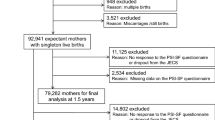Abstract
Using data from the Fragile Family Child Wellbeing Study, we examined the psychometric properties of the parental distress subscale of the parenting stress index—short form. Unlike previous studies, we found that the two-factor model did not fit the data significantly better than the one-factor model. Moreover, the results indicated that both the one-factor and the two-factor models provided only a marginal fit to the data. This finding was consistent across two time periods. Implications of these findings and future research are discussed.
Similar content being viewed by others
References
Abidin, R. R. (1995). Parenting stress index (3rd ed.). Odessa, FL: Psychological Assessment Resources.
Arbuckle, J. L. (2007). Amos 16.0 user’s guide. Spring House, PA: Amos Development Cooperation.
Browne, M. W., & Cudeck, R. (1989). Single sample cross-validation indices for covariance structures. Multivariate Behavioral Research, 24, 445–455.
Browne, M. W., & Cudeck, R. (1992). Alternative ways of assessing model fit. Sociological Methods and Research, 21, 230–258.
Browne, M. W., & Cudeck, R. (1993). Alternative ways of assessing model fit. In K. A. Bollen & J. S. Long (Eds.), Testing structural models (pp. 136–162). Newbury Park, CA: Sage.
Comrey, A. L., & Lee, H. B. (1992). A first course in factor analysis (2nd ed.). Hillside, New Jersey: Erlbaum.
Curran, P. J., West, S. G., & Finch, J. F. (1996). The robustness of test statistics to nonnormality and specification error in confirmatory factor analysis. Psychological Methods, 1, 16–29.
Deater-Deckard, K., & Scarr, S. (1996). Parenting stress among dual-earner mothers and fathers: Are there gender differences? Journal of Family Psychology, 1, 45–59.
DiStefano, C., & Hess, B. (2005). Using confirmatory factor analysis for construct validation: An empirical review. Journal of Psychoeducational Assessment, 23, 225–241.
Fan, X., Thompson, B., & Wang, L. (1999). The effects of sample size, estimation methods, and model specification on SEM fit indices. Structural Equation Modeling, 6, 56–83.
Gerbing, D. W., & Anderson, J. C. (1988). An updated paradigm for scale development incorporating unidimensionality and its assessment. Journal of Marketing Research, 25, 186–192.
Green, S. B., Lissitz, R. W., & Muliak, S. A. (1977). Limitations of coefficient alpha as an index of test unidimensionality. Educational and Psychological Measurement, 37, 827–838.
Haskett, M. E., Ahern, L. S., Ward, C. S., & Allaire, J. C. (2006). Factor structure and validity of the parenting stress index-short form. Journal of Clinical Child and Adolescent Psychology, 35, 302–312.
Hoyle, R. H. (1995). Structural equation modeling: Concepts issues, and applications. Thousand Oaks, CA: Sage Publications.
Hu, L., & Bentler, P. M. (1999). Cutoff criteria for fit indices in covariance structure analysis: Conventional criteria versus new alternatives. Structural Equation Modeling, 6, 1–31.
Kline, R. B. (2004). Principles and practice of structural equation modeling (2nd ed.). New York: Guildford.
Little, R. J. A., & Rubin, D. B. (1987). Statistical analysis with missing data. New York: Wiley.
McKelvey, L. M., Whiteside-Mansell, L., Faldowski, R. A., Shears, J., Ayoub, C., & Hart, A. D. (2009). Validity of the short form of parenting stress index for fathers of toddlers. Journal of Child and Family Studies, 18, 102–111.
McKnight, P. E., McKnight, K. M., Sidani, S., & Figueredo, A. J. (2007). Missing data: A gentle introduction. New York: Guilford Press.
Muthen, B. B., & Kaplan, D. (1985). A comparison of some methodologies for the factor analysis of non-normal likert variables. The British Journal of Mathematical and Statistical Psychology, 38, 171–189.
Osburn, H. G. (2000). Coefficient alpha and related internal consistency reliability. Psychological Methods, 5, 343–355.
Raftery, A. E. (1993). Bayesian model selection in structural equation models. In K. A. Bollen & J. S. Long (Eds.), Testing structural equation models (pp. 163–180). Newbury Park, CA: Sage.
Raykov, T. (2001). Approximate confidence interval for difference in fit of structural equation models. Structural Equation Modeling, 8, 458–469.
Reichman, N. E., Teitler, J. O., Garfinkel, I., & McLanahan, S. S. (2001). Fragile families: Sample and design. Children and Youth Services Review, 23, 303–326.
Schaefer, J. L., & Graham, J. W. (2002). Missing data: Our view of the state of the art. Psychological Methods, 7, 147–177.
Schmitt, N. (1996). Uses and abuses of coefficient alpha. Psychological Assessment, 4, 350–353.
van der Heijden, P. G., van Buuren, S., Fekkes, M., Radder, J., & Verrips, E. (2003). Unidimensionality and reliability under Mokken scaling of the Dutch language version of the SF-36. Quality of Life Research, 12, 189–198.
Whiteside-Mansell, L., Ayoub, C., McKelvey, L., Faldowski, R. A., Hart, A., & Shears, J. (2007). Parenting stress of low-income parents of toddlers and preschoolers: Psychometric properties of a short form of the parenting stress index. Parenting Science and Practice, 7, 27–56.
Zaidman-Zait, A., Mirenda, P., Zumbo, B. D., Wellington, S., Dua, V., & Kalynchuk, K. (2010). An item response theory analysis of the Parenting Stress Index-Short Form with parents of children with autism spectrum distorders. Journal of Child Psychology and Psychiatry, 51, 1269–1277.
Author information
Authors and Affiliations
Corresponding author
Rights and permissions
About this article
Cite this article
Farmer, A.Y., Andrew Peterson, N. Psychometric Properties of the Parental Distress Subscale. J Child Fam Stud 21, 747–753 (2012). https://doi.org/10.1007/s10826-011-9527-3
Published:
Issue Date:
DOI: https://doi.org/10.1007/s10826-011-9527-3




